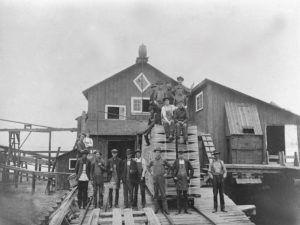
White Marble Lime Company shingle mill workers
In April of 1920, the vast majority of men employed in the timber industry in Manistique were required to work ten hours per day, six days per week. The International Timberworkers Union District No. 2, headquartered in Rhinelander, Wisconsin, warned industry executives of a strike by its members if certain demands were not met. These included: an eight hour work day; minimum wage of $100.00 per month; board for men in the woods; no overtime, Sunday or holiday work; a wage of $5.00 per day for men driving logs on the rivers; pay dates twice per month; abolition of contracts, piece work and bonus systems; and recognition of the union.
